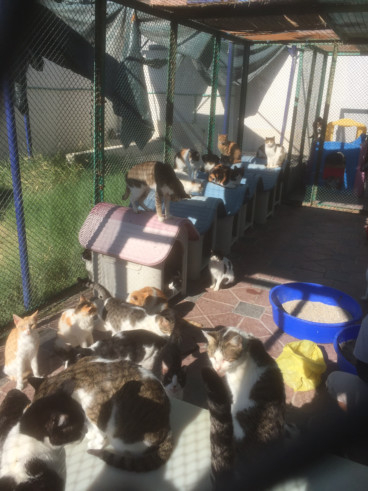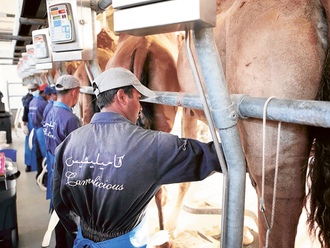
Dubai: Daad Nassif, the founder of Abu Dhabi-based animal welfare group called Wags and Purrs, was contacted by a shelter in Dubai’s Al Barsha area. It was shutting down and leaving 92 cats and five dogs homeless. Being an animal activist, Nassif couldn’t see that happen and made it her mission to help rehome them.
Nassif told Gulf News: “The shelter is a villa that has been converted to home all these animals that have been abandoned by their owners for various different reasons. The major reason being that when an animal was unwell, it was taken to a clinic by the owners and never picked up. The clinic then contacted the shelter and informed them about this abandoned animal. They previously had chickens, falcons and some other birds but they were all rehomed. I visited the shelter a few days ago to check the space, get more information and see the animals. I wanted to make sure if they were even fit to be rehomed.”
Nassif says that the conditions of the animals was concerning.
She said: “Some of them are blind, some with eyes removed surgically, some are over 16 years old, some have neurological problems and some are FIV (Feline Immunodeficiency Virus) positive. There are between 40 to 50 of them that are fairly healthy and potential candidates for rehoming.”
These healthier candidates are also suffering from minor issues. Some have a flu, ranging from mild to acute, but Nassif says that this can be sorted out easily with vaccines or antibiotics.
She said: “They are really friendly and quite adorable. None of these cats need a surgery or any major procedures. If we can find a place for them, it would be easier for them to adjust to the situation of being indoors and fostered.”
Most of the cats are neutered and spayed. However, they haven’t received any medical care in the past 18 months.
Nassif said: “The person in charge of the shelther left the country, leaving behind all these animals. There is a team of two people who have been struggling to keep up and trying to rehome the animals. But, it is quite an overwhelming and emotional challenge for them. They have no experience.”
Some older felines were dropped off at the shelter as their retirement home.
Nassif said: “Due to the owner, these cats are now going to be back on the street. They’ve never been advertised for rehoming until now. Humans have forced them to lose their home. However, it is not our priority to domesticate them. The best we can do is find a farm or sanctuary where they can spend the rest of their lives.”
She talks about a 17-year-old cat who is completely blind.
She said: “This was supposed to be her home, but now she is homeless. What is her fault? What did she do to deserve this fate?”
When visiting the shelter, Nassif says she helped segregate the cats and pointed out the ones that needed to be put down.
She said: “It was a very tough decision, but they were very unwell and we wanted to make sure they wouldn’t spread the illnesses. Our priority at this point would be to spend money to get the healthier ones checked and prepared for adoption. The people in charge agreed and said they would take the cats to the clinic for the necessary steps.”
At this point, Nassif hopes to raise as much awareness as possible to find foster homes for the healthy cats.
She said: “I cannot take in 50 cats and put them in lodging. To get a cat’s medical done, it costs at least Dh700. This includes vaccination, health check and deworming; the standard procedure to make sure it is ready to be taken to a home. If I take all 50 cats, that’s an average of Dh35,000. At the end of the day, we are volunteers. We need to be smart about how we use our resources. We need to find homes for these cats, instead of leaving them in boarding.”
The people who are now in charge do not live in the villa, but have taken the responsibility of buying food and litter.
Nassif said: “I personally feed 200 stray cats. I know how much it costs to buy the cheapest kind of cat food. A bag of 10 kilogrammes of food costs between Dh250 to Dh330. I feed the colony stray cats every other day; four feeds a week. That’s about Dh1,500 a week and over Dh5,000 a month. But, these are strays. The ones in the shelter have been living in some kind of a homely environment and would expect a good quality diet. The food cost per month would then be around Dh10,000. So, I can imagine that the people in charge must be struggling.”
People have come forth and offered to pay for the food or even the house rent for another year.
Nassif said: “I don’t want people offering to pay rent. We don’t know if the landlord will extend the lease. Plus, the rent would be over Dh200,000 per year. Why spend so much on a space that is not appropriate to be a shelter? I’m concerned that people are looking for the easy way out. A foster home would be much better for these felines. They will become more social and have a normal life. It has to be a team effort to save these animals.”
There is a housekeeper who has been placed in the shelter with the animals to take care of them and clean up the litter boxes. According to Nassif, it is way too much for one person to handle. She is unhappy that some people who have no understanding or experience with cats are operating shelters around the emirate, such as this one. The animals have to suffer due to their mistake. She hopes that as many animal shelters in the UAE would come forth to help out in this situation.
She said: “I have until the end of March to sort this out. The house needs to be vacated then. I have been receiving messages from people who I don’t even know, asking me to put all the cats to sleep. I’m not a fan of mass murder! We still have a month and would like to help as many of them as possible. Though, I am realistic; I don’t expect them all to be rehomed. But, even if I get 20 of them homed, I would have made a difference. Because of one human’s poor decision, they are already suffering.”








